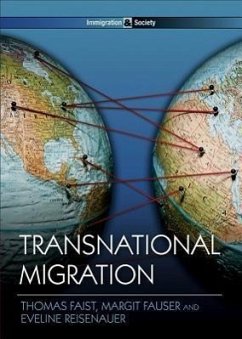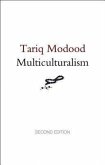- Gebundenes Buch
- Merkliste
- Auf die Merkliste
- Bewerten Bewerten
- Teilen
- Produkt teilen
- Produkterinnerung
- Produkterinnerung
This systematic and critical overview of transnational migration perfectly balances theoretical discussion with relevant examples and cases, making it an ideal book for upper-level students covering immigration and transnational relations, on sociology, political science, and globalization courses.
Andere Kunden interessierten sich auch für
![Multiculturalism Multiculturalism]() Tariq ModoodMulticulturalism72,99 €
Tariq ModoodMulticulturalism72,99 €![Beyond the Two-State Solution Beyond the Two-State Solution]() Yehouda ShenhavBeyond the Two-State Solution61,99 €
Yehouda ShenhavBeyond the Two-State Solution61,99 €![Disasters Without Borders Disasters Without Borders]() John HanniganDisasters Without Borders71,99 €
John HanniganDisasters Without Borders71,99 €![How Migration Really Works How Migration Really Works]() Hein de HaasHow Migration Really Works8,99 €
Hein de HaasHow Migration Really Works8,99 €![The Strange Death of Europe The Strange Death of Europe]() Douglas MurrayThe Strange Death of Europe11,99 €
Douglas MurrayThe Strange Death of Europe11,99 €![Should Rich Nations Help the Poor? Should Rich Nations Help the Poor?]() David HulmeShould Rich Nations Help the Poor?68,99 €
David HulmeShould Rich Nations Help the Poor?68,99 €![Oriental Identities in Super-Diverse Britain Oriental Identities in Super-Diverse Britain]() T. BarberOriental Identities in Super-Diverse Britain38,99 €
T. BarberOriental Identities in Super-Diverse Britain38,99 €-
-
-
This systematic and critical overview of transnational migration perfectly balances theoretical discussion with relevant examples and cases, making it an ideal book for upper-level students covering immigration and transnational relations, on sociology, political science, and globalization courses.
Hinweis: Dieser Artikel kann nur an eine deutsche Lieferadresse ausgeliefert werden.
Hinweis: Dieser Artikel kann nur an eine deutsche Lieferadresse ausgeliefert werden.
Produktdetails
- Produktdetails
- Verlag: Polity Press
- Seitenzahl: 210
- Erscheinungstermin: 18. März 2013
- Englisch
- Abmessung: 236mm x 159mm x 20mm
- Gewicht: 459g
- ISBN-13: 9780745649771
- ISBN-10: 0745649777
- Artikelnr.: 36693579
- Herstellerkennzeichnung
- Libri GmbH
- Europaallee 1
- 36244 Bad Hersfeld
- gpsr@libri.de
- Verlag: Polity Press
- Seitenzahl: 210
- Erscheinungstermin: 18. März 2013
- Englisch
- Abmessung: 236mm x 159mm x 20mm
- Gewicht: 459g
- ISBN-13: 9780745649771
- ISBN-10: 0745649777
- Artikelnr.: 36693579
- Herstellerkennzeichnung
- Libri GmbH
- Europaallee 1
- 36244 Bad Hersfeld
- gpsr@libri.de
Thomas Faist is professor of transnational, development and migration studies at the Bielefeld University, Germany. Margit Fauser is a researcher in the department of sociology at Bielefeld University, Germany. Eveline Reisenauer is a researcher in the department of sociology at Bielefeld University, Germany.
Preface and Acknowledgements viii
1 Three Transnationals: Transnationalization, Transnational Social Spaces
and Transnationality 1
Cross-border migration and the need for a transnational perspective 5
Unpacking the transnational 7
Aim and structure of the book 17
2 Transnationality and Social Practices 27
Familial transnational practices 28
Socio-cultural transnational practices 32
Economic transnational practices 35
Political transnational practices 39
The significance of transnational practices 43
3 Conceptualizing Transnationalization and Transnational Social Spaces 46
Transnationalization in historical perspective 47
The concept of transnational social spaces 53
The durability of transnationalization 61
4 Transnationalization and Development 66
Three phases of the debate 68
Remittances and their role for family and kin 70
Transnational investment and business 74
Hometown associations and their contributions to community development 75
Transnational circulation of knowledge 80
Social remittances and their effects 84
5 Transnationality and the Models of Migrant Integration 88
Transnationalism as a model of integration 91
The relationship between transnationality and integration 95
Second-generation transnationality 102
Migrant associations as a means of integration and transnationalization 106
6 States and Citizens - Transnational Political Practices and Institutions
109
Citizenship: a conceptual sketch 111
The policies of citizenship: the case of dual citizenship 114
The politics of citizenship: citizens, diasporas and states 121
Transnational citizenship? 133
7 Transnational Methodology 135
Three methodological challenges for transnational analysis 136
Methods to address the three challenges 145
Capturing simultaneity 157
8 Transnationalizing Civil Society 159
Civil society and transnational social spaces 161
The relevance of development, social integration and citizenship for civil
society 164
Civil society and the state 168
Civil society and the market 171
Civil society and the family 172
The role and function of migrant transnational social spaces for civil
society 175
The signifi cance of a transnational approach for the social sciences 179
Notes 183
References 185
Index 203
1 Three Transnationals: Transnationalization, Transnational Social Spaces
and Transnationality 1
Cross-border migration and the need for a transnational perspective 5
Unpacking the transnational 7
Aim and structure of the book 17
2 Transnationality and Social Practices 27
Familial transnational practices 28
Socio-cultural transnational practices 32
Economic transnational practices 35
Political transnational practices 39
The significance of transnational practices 43
3 Conceptualizing Transnationalization and Transnational Social Spaces 46
Transnationalization in historical perspective 47
The concept of transnational social spaces 53
The durability of transnationalization 61
4 Transnationalization and Development 66
Three phases of the debate 68
Remittances and their role for family and kin 70
Transnational investment and business 74
Hometown associations and their contributions to community development 75
Transnational circulation of knowledge 80
Social remittances and their effects 84
5 Transnationality and the Models of Migrant Integration 88
Transnationalism as a model of integration 91
The relationship between transnationality and integration 95
Second-generation transnationality 102
Migrant associations as a means of integration and transnationalization 106
6 States and Citizens - Transnational Political Practices and Institutions
109
Citizenship: a conceptual sketch 111
The policies of citizenship: the case of dual citizenship 114
The politics of citizenship: citizens, diasporas and states 121
Transnational citizenship? 133
7 Transnational Methodology 135
Three methodological challenges for transnational analysis 136
Methods to address the three challenges 145
Capturing simultaneity 157
8 Transnationalizing Civil Society 159
Civil society and transnational social spaces 161
The relevance of development, social integration and citizenship for civil
society 164
Civil society and the state 168
Civil society and the market 171
Civil society and the family 172
The role and function of migrant transnational social spaces for civil
society 175
The signifi cance of a transnational approach for the social sciences 179
Notes 183
References 185
Index 203
Preface and Acknowledgements viii
1 Three Transnationals: Transnationalization, Transnational Social Spaces
and Transnationality 1
Cross-border migration and the need for a transnational perspective 5
Unpacking the transnational 7
Aim and structure of the book 17
2 Transnationality and Social Practices 27
Familial transnational practices 28
Socio-cultural transnational practices 32
Economic transnational practices 35
Political transnational practices 39
The significance of transnational practices 43
3 Conceptualizing Transnationalization and Transnational Social Spaces 46
Transnationalization in historical perspective 47
The concept of transnational social spaces 53
The durability of transnationalization 61
4 Transnationalization and Development 66
Three phases of the debate 68
Remittances and their role for family and kin 70
Transnational investment and business 74
Hometown associations and their contributions to community development 75
Transnational circulation of knowledge 80
Social remittances and their effects 84
5 Transnationality and the Models of Migrant Integration 88
Transnationalism as a model of integration 91
The relationship between transnationality and integration 95
Second-generation transnationality 102
Migrant associations as a means of integration and transnationalization 106
6 States and Citizens - Transnational Political Practices and Institutions
109
Citizenship: a conceptual sketch 111
The policies of citizenship: the case of dual citizenship 114
The politics of citizenship: citizens, diasporas and states 121
Transnational citizenship? 133
7 Transnational Methodology 135
Three methodological challenges for transnational analysis 136
Methods to address the three challenges 145
Capturing simultaneity 157
8 Transnationalizing Civil Society 159
Civil society and transnational social spaces 161
The relevance of development, social integration and citizenship for civil
society 164
Civil society and the state 168
Civil society and the market 171
Civil society and the family 172
The role and function of migrant transnational social spaces for civil
society 175
The signifi cance of a transnational approach for the social sciences 179
Notes 183
References 185
Index 203
1 Three Transnationals: Transnationalization, Transnational Social Spaces
and Transnationality 1
Cross-border migration and the need for a transnational perspective 5
Unpacking the transnational 7
Aim and structure of the book 17
2 Transnationality and Social Practices 27
Familial transnational practices 28
Socio-cultural transnational practices 32
Economic transnational practices 35
Political transnational practices 39
The significance of transnational practices 43
3 Conceptualizing Transnationalization and Transnational Social Spaces 46
Transnationalization in historical perspective 47
The concept of transnational social spaces 53
The durability of transnationalization 61
4 Transnationalization and Development 66
Three phases of the debate 68
Remittances and their role for family and kin 70
Transnational investment and business 74
Hometown associations and their contributions to community development 75
Transnational circulation of knowledge 80
Social remittances and their effects 84
5 Transnationality and the Models of Migrant Integration 88
Transnationalism as a model of integration 91
The relationship between transnationality and integration 95
Second-generation transnationality 102
Migrant associations as a means of integration and transnationalization 106
6 States and Citizens - Transnational Political Practices and Institutions
109
Citizenship: a conceptual sketch 111
The policies of citizenship: the case of dual citizenship 114
The politics of citizenship: citizens, diasporas and states 121
Transnational citizenship? 133
7 Transnational Methodology 135
Three methodological challenges for transnational analysis 136
Methods to address the three challenges 145
Capturing simultaneity 157
8 Transnationalizing Civil Society 159
Civil society and transnational social spaces 161
The relevance of development, social integration and citizenship for civil
society 164
Civil society and the state 168
Civil society and the market 171
Civil society and the family 172
The role and function of migrant transnational social spaces for civil
society 175
The signifi cance of a transnational approach for the social sciences 179
Notes 183
References 185
Index 203








